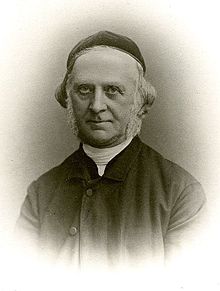Christian Oberhey
Christian Oberhey (born February 12, 1818 in Braunschweig ; † December 24, 1905 there ; full name Heinrich Ludwig Christian Oberhey ) was a German Evangelical Lutheran theologian , pastor in the Evangelical Lutheran Church in Braunschweig and hymnologist .
Life
The son of a grocer in the small street food stall in Braunschweig he attended as a student the nearby Martino-Katharineum , moved in 1838 to the Collegium Carolinum , where he completed his education in 1839 for university studies with the High School from. This was followed by studying theology at the University of Jena . There he heard lectures from Karl Hase and Ludwig Friedrich Otto Baumgarten-Crusius . Two years later he enrolled at the University of Göttingen to take part in the lectures of Friedrich Lücke , a then well-known and recognized interpreter of the Gospel of John .
In September 1843 Oberhey passed his theological pre- exam in Wolfenbüttel . In an overall long and reluctant time of ten years up to the main examination, he found small jobs as a private tutor in various places, and finally as an extraordinary teacher at the western district school in Braunschweig. In 1853 he passed the main examination with the grade "well passed". For a short time he took over the pastor's care in Denstorf as a temporary help for the sick Pastor Rohde. In 1855 he attended the seminary in Wolfenbüttel. At the same time he taught at the local community school and used his free time to read in the Wolfenbüttler library .
Oberhey began his first pastoral position in 1856 in Wieda . In 1868 he was appointed to Wendeburg as superintendent . In 1877, at his own request, he took over the vacant position as pastor of the Parochie Wahle . In 1893 he was awarded the title of Council of Churches . Two years after his retirement - on the occasion of his 80th birthday - was it by the theological faculty of the University of Goettingen, his former alma mater , the honorary doctorate awarded.
Appreciation
Christian Oberhey has a two-volume monograph for Brunswick hymnbook written by 1779/80, in which he described the creation of this hymnal of the Enlightenment describes. He names the author and the source of the songs as well as the textual changes made to them. Without his detailed work, it would hardly be possible today that changed over time song starts their original hymn texts assign and songs created in the 18th century their authors. He defended the selection of songs in this hymn book against attacks by the confessional- Lutheran camp and nevertheless advocated the production of a new hymn book. In this way he contributed to the creation of the hymn book for the Evangelical Lutheran Church of the Duchy of Braunschweig from 1902 . It was the first hymnbook with sheet music over most of the lyrics, and the songs were labeled with the names of the authors and composers. It was replaced in 1950 by the Protestant church hymn book.
Fonts (selection)
- The Braunschweig hymnbook according to its creation and design. Contribution to the history of the hymnal reform in the previous century. [1. Contribution] The Braunschweigische Gesangbuch after its creation and design. GCE Meyer, Braunschweig 1880.
- The songs in the Braunschweig hymn book are described one after the other with regard to their origin and design: second contribution to the history of the hymnal reform in the last century. GCE Meyer, Braunschweig 1898.
- Melanchthon's poems / Philippus Melanchthon. Selected and translated by Christian Oberhey. Mühlmann, Halle 1897.
- The God's fountain of mankind: An introduction to the Gospel of John. Meyer, Braunschweig 1902.
literature
- Dietrich Kuessner : The Braunschweigische Gesangbuch: Inquiries and observations on its history and shape from the Reformation to today. Self-published, Braunschweig 2008. Digitized
- Barbara Stroeve: Sung Enlightenment: Investigations into Northwest German hymn book reforms in the late 18th century. Dissertation University of Oldenburg 2005. Digitized
Web links
- Estate: Oberhey, Christian (1818–1905) in the Lower Saxony State Archives (NLA) - Wolfenbüttel State Archives
Individual evidence
- ↑ Braunschweigisches Adressbuch for the year 1852. Edition 40. Verlag Gebr. Meyer, Braunschweig 1852, p. 133.
- ↑ Braunschweigisches Adressbuch for the year 1855. Edition 43. Verlag Gebr. Meyer, Braunschweig 1855, pp. 130 and 141.
- ^ Paul Zimmermann (historian) : Christian Oberhey †. In: Braunschweigisches Magazin. 3. Zwißler, Wolfenbüttel 1906, p. 25 ff.
- ^ Georg Seebaß, Friedrich-Wilhelm Freist: The pastors of the Braunschweig Evangelical Lutheran Church since the Reformation was introduced. Vol. 2. Ed. Landeskirchenamt, Wolfenbüttel 1974, p. 220.
- ^ Klaus Pfeiffer: From the Wiedaer church history: Pastor Christian Oberhey. In: Our Harz. Vol. 46, No. 2. Oberharzer Dr. u. Verl. Fischer & Thielba, Bad Harzburg 1998, ISSN 2193-7125 , p. 26 f.
- ↑ Articles and correspondence on Pastor Church Council Oberhey 1818–1905. In: Landeskirchliches Archiv Wolfenbüttel under LAW KE 173 acc 59/02.
- ↑ Barbara Stroeve: Gesungene Aufklerung: Investigations into northwest German hymnal reforms in the late 18th century. Dissertation University of Oldenburg 2005, p. 118 ff.
- ↑ Dietrich Kuessner: The Braunschweigische Gesangbuch: Inquiries and observations on its history and shape from the Reformation to today. Self-published, Braunschweig 2008, p. 67.
- ↑ Dietrich Kuessner: The Braunschweigische Gesangbuch: Inquiries and observations on its history and shape from the Reformation to today. Self-published, Braunschweig 2008, p. 86.
| personal data | |
|---|---|
| SURNAME | Oberhey, Christian |
| ALTERNATIVE NAMES | Oberhey, Heinrich Ludwig Christian (full name) |
| BRIEF DESCRIPTION | German Evangelical Lutheran theologian |
| DATE OF BIRTH | February 12, 1818 |
| PLACE OF BIRTH | Braunschweig |
| DATE OF DEATH | December 24, 1905 |
| Place of death | Braunschweig |

